| Construction Rating: | starstarstarstarstar_border |
| Flight Rating: | starstarstarstarstar |
| Overall Rating: | starstarstarstarstar_border |
| Manufacturer: | FlisKits  |
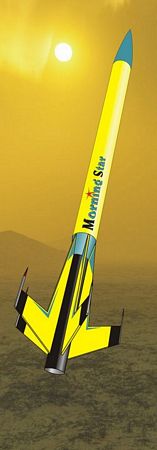
Brief:
The Morning Star is a nice looking futuristic design from FlisKits that still looks like a traditional rocket. It is
not trying to be an extra from a sci-fi series. It's simple but cool.
Construction:
Construction began by my locating a spent 24mm casing and marking off 1/4" from one end. A ring of white glue
was then applied inside the BT-50 motor tube using a swab held against the marked casing as a reference distance. A
thrust ring was then inserted and pushed into place using the spent casing which was then immediately removed.
As the glue on the thrust ring dried, I cut out the wraparound fin marking guide. Often times, these are printed on very light stock that does not hold up well especially when being used to cut out fins. More rarely, it is very heavy cardstock which is great for the fins but which makes the wraparounds more difficult to deal with. In this case, it was just right.
The wrap was taped into place and I used my handy dandy FlisKits mechanical pencil to transfer the five fin lines to the BT. The wrap was then removed and the lines were extended the length of the tube with and Estes angle.
Next up was the forming of the transition. It is made from the same paper as the fin guide. This normally makes be a bit leery since my origami skills are nil. I was somewhat reassured that FlisKits provided and extra. As it turns out, the extra was not needed. I cut out the first one, dragged it over the edge of the desk to give it some curl and then glued the tab with just a hint of white glue. I then let it set up for a bit.
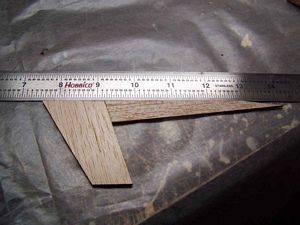 With the transition glue dry, I slid the transition onto the lower BT starting with and
making sure of which end had the thrust ring. The instructions indicated that it is much easier to slide into place
when the large diameter is slipped on first. The tightness of the fit was such that I know the instructions are right.
I also took it as an indication that I had done a decent job of rolling the transition.
With the transition glue dry, I slid the transition onto the lower BT starting with and
making sure of which end had the thrust ring. The instructions indicated that it is much easier to slide into place
when the large diameter is slipped on first. The tightness of the fit was such that I know the instructions are right.
I also took it as an indication that I had done a decent job of rolling the transition.
The transition was moved to the opposite end of the tube and then 3/8" was marked off along one of the fin lines. I then put the fin marking guide back in place and used it to draw a ring around the tube at the 3/8" mark. This would form the aft end of the fins.
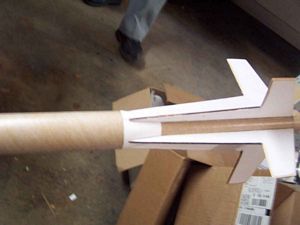 After putting on the transition, life got busy and it was more than a month before I had a
chance to work on this rocket again. I made the mistake of just jumping right in without a re-familiarization course.
After putting on the transition, life got busy and it was more than a month before I had a
chance to work on this rocket again. I made the mistake of just jumping right in without a re-familiarization course.
According to the instructions, the fins are mounted first and then the strakes are mounted to the fins. I remembered hearing from Jim Flis that it should be alright to glue the parts together first and proceeded to do that. I set a fin down on some wax paper and then used CA to affix the strake to the fin using a steel ruler to keep the edges aligned. This part went well.
I decided that I wanted to seal the fins before putting them in place and wanted to do it easily. I decided to try a method I had only tried once before and used peel and stick labels to do the sealing. I peeled the backing off of an Avery sheet of 8.5" x 11" labeling and pressed the fins down flat. I then used a razor blade to trim away the excess. When done, I flipped the fins over and applied the labeling to the opposite site and trimmed them out. Some thin CA was then used to seal all the edges. I don't really expect any trouble from this step either.
The next part is where the brain was not fully engaged. I always do my airfoiling before putting the fins in place. I realized that the outer edge of the strake would look good flat since it would be coming up off the transition so I did not round it. Instead, I just rounded the leading and trailing edges of the fins with sandpaper. The I rounded the outer edges and realized my mistake. Later on, some toothpicks are going to be glued to the outer edges and I am really going to miss having them flat.
One of the most critical stages in the building of this rocket is the placement of the fins. They all have to line up along the same line so the transition will fit properly. I had carefully marked the ring of aft alignment and prepared to install the first fin using yellow glue and a double glue joint. When the glue was tacky, I pressed the fin in place and realized that my sanding of the trailing edges has quite possibly caused some problems with getting and exact fit.
After a lot of angst, I checked the distance from the front edge of the fin strake to the aft end of the tube. I figured that as long as I kept that constant, the strakes should line up with the paper transition satisfactorily. The problem I have with an operation like this is the ruler. I know better, but something deep inside of me says that all those little tick marks between the digits are "optional". I do know how to read them but I seem to get a different result each time so I went metric.
The remaining fins were put on with yellow glue double joints. I am prepared to swear on a stack of bibles that the numbers were correct when I applied the fins. The got sneaky and shifted a bit as the glue dried however.
As the fins were drying, I began to work on the nosecone. I decided to try something I had read about. Instead of using Elmer's Wood Filler, I drizzled thin CA all over it to harden it up before trying to sand it smooth. It gave my tear ducts a workout, but the NC is definitely a lot more durable now than when it came to me. I also screwed in the screw eye on the base of the NC and secured it with a dab of yellow glue.
When the fins were firmly glued into place, it was time to see how well the transition shroud fit. I slid it down, keeping the joint on the transition aligned with one of the strakes to keep it hidden. It fit better than I had hoped. There were a few gaps but they would be easy to take care of. It was not glued into place yet.
One of the centering rings was slid down over the motor tube and seated into the transition. It went in a bit deeper than I had expected but there was still enough showing to allow the upper BT to have something to hold on to. The ring was glued into place.
The upper ring was then put on flush with the forward end of the tube and glued into place. The Kevlar® shock cord mount was then tied around the top of the up and glued to the bottom of the centering ring.
When the glue on the rings had dried, the upper body tube was test fit and found to be fine. It was then removed, glue swabbed into the interior, the Kevlar® passed through, and it was placed. I was very happy with the fit.
I took a break from the exacting, for me, fin work and decided to spend some time doing something a bit more mindless. I sanded down the nose cone and decided it was not quite smooth enough for me yet. Some but not all of the sanding had worn through the CA impregnated layer. I decided to give it one more dose. About an hour later, I sanded again, was satisfied with the result, and primed the NC with Kilz.
The kit comes with five wooden toothpicks to dress up the fins. I don't know if they're supposed to be gun mounts, antennae, probes or parachute/streamer conversion devices but they should dress things up a bit. The instructions have a full size template against which to lay the toothpicks and then cut off one end at a bit of an angle. It was some of the easiest carpentry I've done.
Since I had already rounded the outer edges of the fins, I needed to take a sanding block and flatten them again to make the toothpicks fit better. This was easily done and did not remove too much material.
With the edges flat, the application of the toothpicks to the edges with yellow glue presented no problems. A double joint was used and the results certainly look better if the bevel cut is placed so as to be aligned with the trailing edge of the fin. (Don't ask me how I know.)
The last of the real components was the launch lug. It was glued in place just above the transition centered between 2 fins with yellow glue.
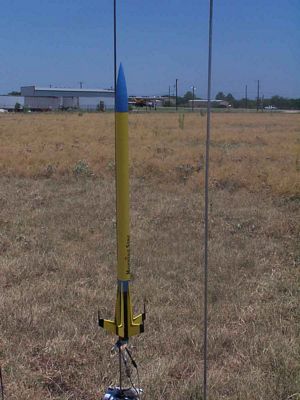
Finishing:
Most of the time, I prime my rockets with Kilz. When I was ready to start on this one, I found I was completely out.
I searched around and found some cheap, generic white primer and decided to try that. The rocket was put in the booth
and given 3 coats of white. When it was taken out, I did some sanding to remove some rough spots and then gave it one
more coat of white.
The first of the "real" colors I used was a light yellow. Since it would be the lightest, I did not bother to do any masking. I put the rocket in the booth and started to spray, making sure that all the areas that would be yellow got covered. I did not worry where black would cover.
The next color to be used was to be a light blue. I did not have anything that exactly matched the face card so I searched for the 2 lightest shades I did have. I chose the one that seemed to complement the blue on the decals best.
The masking was tough but doable. I used Frog Tape and aluminum foil to mask off most of the body tube, leaving the NC exposed, and then masked off the fins along the root edges. I left the tips of the fins exposed. Because I was worried about leakage under the tape, I tried something I read about on TRF. I sprayed the masked area with clear sealer in the hope that it would help form a barrier.
With the masking done, I set the rocket in the booth and started spraying the light blue I had chosen. I got the nose cone and the paper transition. Again, I did not worry about overspray because the next color was black and I figured that would cover fine.
When the blue paint had dried, I did not remove the masking. Instead, I just added more masking to protect the blue areas and prepped the rocket for black paint.
When the masking was done, the black was sprayed and allowed to dry for a day.
Finally, the time came to peel back the masking and reveal the extent of the unmitigated disaster. The nosecone looked pretty good...
...the rest did not. Lifting the tape lifted much of both the blue and the black paint. The result was ugly! After the weeping, wailing and gnashing of teeth, I sanded away the worst of the offensive paint chips and began to mask for blue again.
I was not yet ready to give up on the idea of sealing the edges of the tape with clear so I gave the rocket a couple of shots and let that dry for 15 minutes. I then started to spray the blue again.
This time, I did not let the paint dry all the way before taking up the masking. The result was much better, although the black was going to be a bear.
I did not look forward to masking for black again so I decided to take another tack. I got out some brushed acrylic and began to apply it. Just having the more or less solid black improved things dramatically but some touching up was still needed. I figure it will take several cycles of painting by brush with ever finer brushes to get an acceptable result.
Over the course of a week, I kept trying to fix up the paint job. I would spray the yellow I had used into a bowl and brush it on and then go back with the black acrylic. I could never get anything approximating a straight line so I went to plan C.
Plan C involved using a piece of cardstock as a painting shield. I would hold it against the fin and then brush on the black. I learned to do this painting trim on houses and using a wide, flexible putty knife as the shield. The shield idea worked but I could never remove it without brushing up against the wrong surface and destroying the work done to date. Time for plan D.
I brushed on some more of the yellow, not minding if it invaded the black areas. I wanted to let this part dry thoroughly.
After giving the yellow a couple of days to dry, it was time to try the black again. I again planned to brush on black acrylic but this time I was just going to do one side at a time. I selected the first victim and masked off the yellow, this time with cellophane tape. I made sure to burnish down the edges. It looked like success was at hand. I brushed on the black very carefully going only to the fin and about midway between the fins. I washed out the brush and peeled off the tape to see the result. The paint had once again wicked up the tape. Another failure. I will implement plan E as soon as I think of it.
After sitting around and sulking for a while, plan E became something of a rehash and conflation of earlier approaches. I used the Frog Tape again but did not spray and brushed on more of the acrylic black after first killing the previous black blunders with more yellow. I decided to do only a single side of a single fin to see how it worked out first. The result was much less than perfect but much better than anything so far. Plan E was a go.
I painted the black on each side of each fin individually, masking and removing as I went. The resulting lines are not perfect and there was one place that would need a yellow touch up but it was the best I had gotten this beast thus far. After fighting it for so long, I wanted to call it a draw.
My hope of putting the painting to rest was premature. When I checked the rocket the next day, I saw that some of the black had been lifted or had never been applied. Be that as it may, it was outside of even my lax tolerances.
With Uncle Louie looking on and making comments about speech unbecoming to the clergy, I pulled out the black acrylic and brushed some more on, not bothering with the masking this time. I figured that if the line looked straight from 25 feet, who was I to correct nature? The rocket clearly did not want to have perfect lines.
The acrylic dried quickly and in any event was not in an area to receive decals so I continued to work.
The decals for this kit are waterslides. They are very simple but effective when used in conjunction with the face card paint scheme. The consist of a name placard, 5 pairs of chevrons for the fins and 5 pairs of lozenges for the strakes. I decided to pluck the low hanging fruit first and apply the name opposite to the launch lug.
One thing I noticed right away is that the efforts I expended looking for the "right" blue were wasted. The blue was chosen to match the decals but the decals do not have a white layer so the blue set on top of the yellow paint of the BT resulted in a greenish logo. It still goes with the scheme fine.
I turned my attention next to the lozenges. They were to be placed where the strakes join the shroud. One was applied to each side of the fin. Care must be taken to ensure that the correct one gets placed on each side since they are mirror images.
I did not get to finish the decals in my first sitting because I was called away to deal with a domestic situation. I did however get 2 pairs of the chevrons placed and that was enough to get an inkling of what the project under my mismanagement was going to look like.
The following day, I got back to work and got the rest of the chevrons placed. I have long liked FlisKits rockets and have most of them but have often been put off by my own lack of creativity and the lack of decals. Even a minimal set like in this kit helps tremendously.
With the construction, painting, repainting, sanding, painting, painting some more, and decal applying done, all the Morning Star lacked was a coating of Future and she would be ready for the maiden flight.
Construction Rating: 4 out of 5
Flight and Recovery:
It was finally time to fly the Morning Star and the opportunity to do so came at a monthly launch of the Alamo
Rocketeers. People liked the looks of it and asked questions about it. It really did look nice but I took care of that.
In a fit of clumsiness, I broke off one of the toothpick probes while prepping the rocket. No matter. It could fly with a reduced sensor suite. With that justification I loaded a C11-3 and set it on the pad. When the button was pushed....Whoosh! It got up a total of zero feet. The nozzle had blown out. A video of the non-event can be seen here.
Since there was no damage done to the rocket, I just put in a fresh motor, another C11-3, and tried again. The same thing happened again...except that the snickers were more audible.
This could not stand! I checked the lot numbers on the rest of my C11-3s and found they were all from the same lot. I decided to with a D12-3. This time it did take off but had a funny sounding whoosh to it. It did not do what light rockets are supposed to do on D12s: it seemed very under powered. Then I stopped thinking about reasons as it arced over and crashed into the ground moments before the ejection charge went off. Another nozzle had blown out, this time in flight. This exercise in abject rocket depravity can be seen here. There was too much bad karma in the air for me to try this one again this day.
A month later, I was ready to try again with the Morning Star having expended more 24mm motors in one morning than I am likely to expend in a year without any mishap. I loaded in a C11-7 and set it on the pad. The command to launch was not without a bit of trepidation but the button was pushed and I was rewarded with a satisfying whoosh and an inability to snap my head fast enough. It took everyone present to track it and that was just by the smoke trail. This thing moves! The parachute ejected just after apogee and the rocket started to drift down on its minuscule 9" chute. I'm glad I used the small one or I would have had a long walk. I am happy to report that the rocket recovered without any damage, even to the toothpicks.
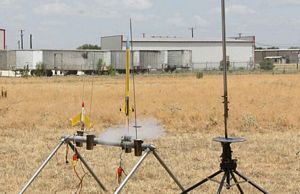
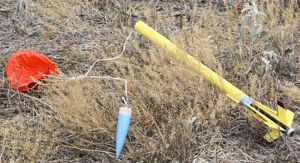
Flight Rating: 5 out of 5
Summary:
I finally broke the jinx! This rocket was an enjoyable build and for me a nightmare to finish. That's not a
reflection on the rocket, just my finishing skills. The first outing was traumatic with 3 blown nozzles from differing
batches of engines. Finally, when it did take off, it performed admirably. I had a hard time tracking it on a C and can
only imagine what it would do on a D or E.
Overall Rating: 4 out of 5
Other Reviews
- FlisKits Morning Star By Chan Stevens (December 21, 2008)
Brief: About 20 years in the making, this futuristic 5FNC design was released by Flis to celebrate their 6th anniversary in 2008. It's a pretty cool design, with fins blending into the transition. This is a design that Jim has been doodling with since the 1980's, originally starting out at 18mm and half the current length, eventually growing to 24mm and 30" length my popular ...
- FlisKits Morning Star By Les Bradshaw (November 4, 2008)
Brief: This is a new offering from FlisKits. It is a single stage that uses parachute recovery. I got the rocket as part of their 6th anniversary celebration. It was quickly delivered in a well packaged box. Construction: There are 2 body tubes, a BT-55 that transitions down to a BT-50. There are 5 forward swept fins that blend into the transition. They provide toothpicks to ...
 |
 |
Flights
Sponsored Ads
 |
 |











